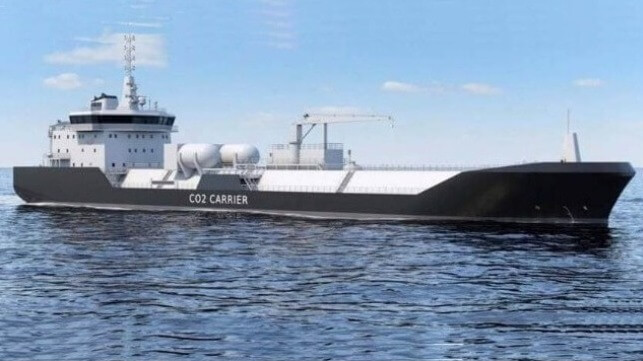Research into Low-Pressure CO2 Shipping for Carbon Capture and Storage

A new project is getting underway exploring the use of low-pressure solutions as a means of scaling up capacities and reducing the transportation cost of captured CO2 to offshore storage facilities. CO2 capture and storage is considered a critical part of the long-term solution in the efforts to decarbonize emissions and meet the climate goals outlined in Paris and Glasgow.
Leading energy companies, Equinor, Shell, TotalEnergies, will be working with Norwegian pipeline operator Gassco and classification society DNV to explore the challenges of CO2 transportation. Multiple projects are exploring the opportunities to use ships as a critical link in the CCS programs currently under development. This partnership looks to leverage their collective experience to develop an industrial-scale shipping solution. They believe that low-pressure transportation systems (approx. 7 bar at -49ºC) versus the current medium pressure (15 bar at -28ºC) technology could provide the ability to scale up CO2 transportation to the scale required for commercial operations.
“As an important part of tackling the climate crisis, reducing costs across the whole CCS value chain is essential,” said Johan Petter Tutturen, VP, Special Projects – Gas at DNV. “Low-pressure CO2 ship designs are a potentially important piece of the chain, but they need to be reliable and meet accepted safety standards. That is why we are very pleased to be working together with this strong consortium of CCS stakeholders to identify the technical risks and challenges to enable safe and economical operations going forward.”
To transport CO2 safely and efficiently at an industrial scale by ship, the joint industry project believes low-pressure transport systems are a potential solution that would enable much larger tank volumes, cargo capacities, and therefore reducing transportation costs. However, they note that the industry currently has little practical experience with the transport of liquid CO2 (LCO2) under these conditions.
The project’s goal is to build experience in low-pressure transport by examining the fundamentals of a low-pressure CO2 transport chain. They plan to test LCO2 behavior at low pressure as well as explore the elements of ship design with low-pressure tanks and cargo handling systems. They will research the choice of material and testing required to develop the systems as well as conditioning and liquefaction.

that matters most
Get the latest maritime news delivered to your inbox daily.
“It is critical that we are able to ship CO2 safely, economically and at scale,” said Syrie Crouch, VP Carbon Capture Utilization and Storage at Shell. “Ensuring these CO2 transport vessels and their associated loading/unloading facilities are standardized to enable interconnectivity between capture and storage facilities will be key to success.”
The project is being funded by Norway’s CLIMIT Programme for research, development, and demonstration of CO2 capture and storage technology (CCS). They expect to complete the research into low-pressure solutions in 2023.
